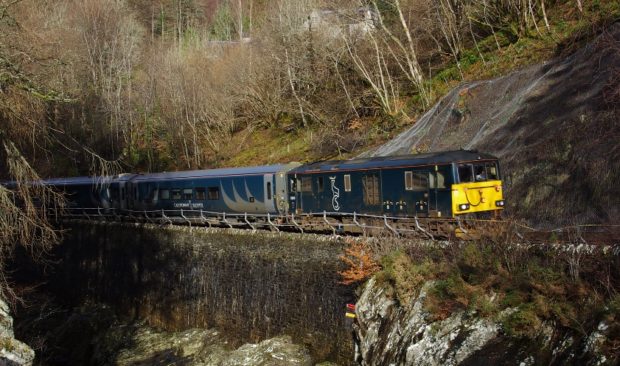Testing is under way on the new fleet of trains for the Caledonian Sleeper service between London and the north.
Six of the new carriages were out for winter testing, running between Polmadie in Glasgow and Fort William on the West Highland Line.
And for two fleeting minutes at Tulloch Station at the weekend, the new carriages – on their way back to Glasgow – passed the current train as it neared the end of its overnight journey from London.
There was a magical moment at Tulloch Station this weekend as Caledonian Sleeper’s future met the present.
Six of the new carriages were tested over the weekend, and the new carriages passed the current train as it neared the end of its overnight journey from London. pic.twitter.com/pSCAp4KGjM
— Caledonian Sleeper (@CalSleeper) March 12, 2019
It comes as trial operations enter the final phase, with preparations being made for the new fleet to begin operating by the end of May 2019.
A recent price hike has been condemned by users of the service and politicians.
Before October, passengers could book a berth on the train for prices as low as £85 based on sharing – that has now risen to a minimum price of £140 for a solo occupancy.
>> Keep up to date with the latest news with The P&J newsletter
The new pricing structure was defended by the company, saying the Sleeper offers a unique service with centre-to-centre travel complete with overnight stay.
Speaking about the weekend test runs, Ryan Flaherty, Serco’s managing director at Caledonian Sleeper, said: “We only have a few weeks of testing left so it feels fitting that our current trains were able to sit alongside our new trains in the wild.
“It’s particularly symbolic because ‘old meets new’ is something we really want to capture when we debut our new carriages. We aim to offer a timeless experience and magical journey for guests, combining the nostalgic feeling of railway travel with modern facilities that travellers expect.”
The fleet, built at a cost of over £100 million and part funded by a capital grant from the Scottish Ministers of £60m, has been designed to accommodate both business and leisure travel guests.
A range of options will be offered, including: double bed with en-suite, club rooms (solo or twin with en-suite); classic rooms; comfort seats; and accessible rooms for guests with reduced mobility.
Other new features will also be included, such as a hotel-style key card entry system, more accessible rooms, charging panels and wifi throughout the train.
The trains will initially be introduced on the Lowlander route between Glasgow/Edinburgh and London before being rolled out onto the Highlander route which serves Fort William, Aberdeen and Inverness.
